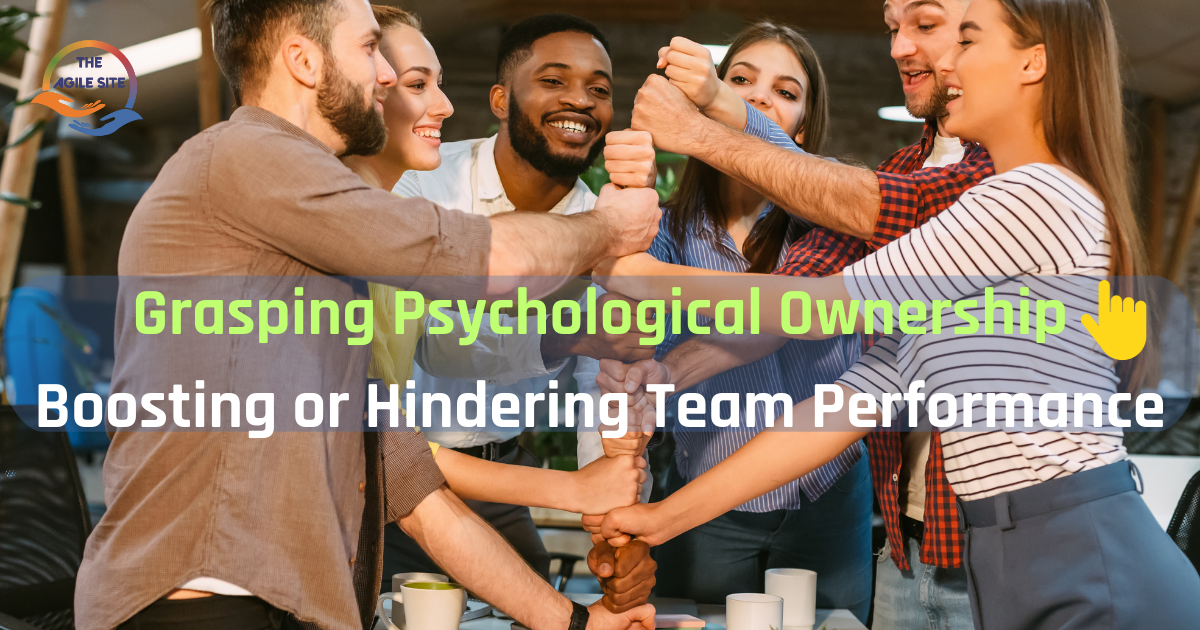11205, Knolls End Spotsylvania, VA 22551, United States
Understanding Psychological Ownership: How It Can Enhance or Hinder Team Effectiveness

Psychological ownership is a two-faced creature. Psychological ownership is rooted in our desires to doing something worthwhile, to create, to be special, and to belong and nourished by our feelings of being successful, autonomous, invested, and an expert. It can significantly enhance your teams' effectiveness or substantially hinder their effectiveness.
What is Psychological Ownership?
So, what is psychological ownership? Psychological ownership is a feeling that one has ownership responsibility for something. Individuals that develop psychological ownership may or may not feel an actual product or tangible ownership – it does not matter. It is all about ownership responsibility. Now the problem is not psychological ownership. It is with how the individual who possesses a sense of ownership responsibility reacts and whether they feel they share that sense of ownership responsibility with the team. Psychological ownership within the team can be manifested as the ownership of a product or solution—the ownership of a plan, a mission, and an idea or option, to name a few.
How does psychological ownership develop?
Psychological ownership starts with one or more of four desires that drive an individual towards psychological ownership, which are:
1. A desire to be engaged in doing something worthwhile:
The desire to be engaged in doing something worthwhile straddles two of Maslow's hierarchy of needs the need for love and belonging and the need for esteem. When we feel that we are doing something worthwhile, we feel a sense of inner peace and of being of value.
2. A desire to create or to produce the intended action or result:
There is a feeling of pride and inner bliss when we create something, regardless of whether it is tangible or intangible. This feeling of creativity is found in the observation at a ball game that we transformed into a judgment, or it may be a painting we painted. There is also a feeling of excitement and pride as we engage in the creation process.
3. A desire to strengthen or preserve one's self-identity as being special or unique:
Ownership helps us build our self-identity as unique and special, which empowers us to feel acceptable, even superior, because of our differences. Such as the two-year-old who says with great pride, "I Stinky," when their diaper needs changing.
4. A desire to belong to or be part of something:
A feeling of belonging helps us manage our stress, feel safe, share, and build confidence. Being around or communicating with other members lifts our spirits and makes us feel stronger and more motivated to move forward. It helps develop our identity, giving us focus and direction as we adopt the goals of the other members.
These desires are formed, nourished, and strengthened by the four enablers or actions associated with the psychological ownership stake:
The Greater the Feeling of Success/Recognition, the Stronger the Enabler.
As an individual receives recognition or success from their psychological ownership, the strength of that psychological ownership increases and hardens. Individuals tend to increase their psychological ownership faster than they reduce it when the recognition is diminished. This imbalance is because we tend to hold on to our past successes as they give us an uplift when we think of them.
The Greater the Feeling of Autonomy/Responsibility, the Stronger the Enabler.
As an individual precedes greater autonomy, control, and responsibility over their psychological ownership stake, their psychological ownership will increase and hardens. But be careful in reducing autonomy, control, or responsibility as it may result in hostile or negative behavior from the individual if they feel their psychological ownership is threatened.
The Greater the Feeling of Individual Investment, the Stronger the Enabler.
As individuals increase their PO stake investment, their psychological ownership will increase and hardens. This increase in investment is the preceded investment. It can result from the time span invested, as in years associated, the concentration of time, as in long hours, the energy invested – physical or mental, or the amount of personal creativity invested.
The Greater the Feeling of the Intimate Knowledge, the Stronger the Enabler.
As individuals' intimate and deep knowledge of their PO stake increases, they become the expert and the go-to person for things relating to their PO stake. The individual need not become an expert but merely a go-to person in their community. With this expertise comes a sense of pride, identity, and psychological ownership, which increases and hardens as their knowledge increase.
Common Areas of Psychological Ownership
Community/Membership – This can be a church, social group, workgroup, a gang. Ownership is in the community and its shared values, more so than the individual members. The members may come and go without a significant emotional impact on the individual.
- Intimate Relationships – These relationships are closer than a community membership. The bonds of ownership are stronger such as family bonds. Ownership is in the members of the relationship. Such as that is my father, mother, child. The bond is more than the family, it is in the intimate relationships. This is a reason that devoice is so painful for all the family members.
- Activities or Positions – As what we commit our time to, our profession or in our spare time. We often title ourselves based on our position or activity, such as Lawyer, Painter, or Gamer. Our title usually travels with us.
- Knowledge – This relates to having special knowledge such as a chemist, or tax preparer. The level of expertise is relative to the community. Such the family technical expert – the teenager who knows about technology. Often called "The Expert" or "An Expert," and sought out for the knowledge that one processes.
- Memory / Feelings – This one is a bit different. It is more linked to memories and feelings, such as childhood community, and a favorite food. It holds a special place in my heart, feelings, and the memories of my childhood days in Nova Scotia. I am a Canadian. I long to visit my home in Nova Scotia, Canada.
- Beliefs – Beliefs held, such as religious beliefs, superstitions, and stories told you. In late 1600 some believed that some girls were witches and executed them. When I see a bird being overly social or hear a know late at night, I get scared that something terrible will happen.
Download our free eBook, "Psychological Ownership – How it affects your team's effectiveness and how to manage it," to learn more about psychological ownership and how to develop and manage it in your team for better effectiveness.

